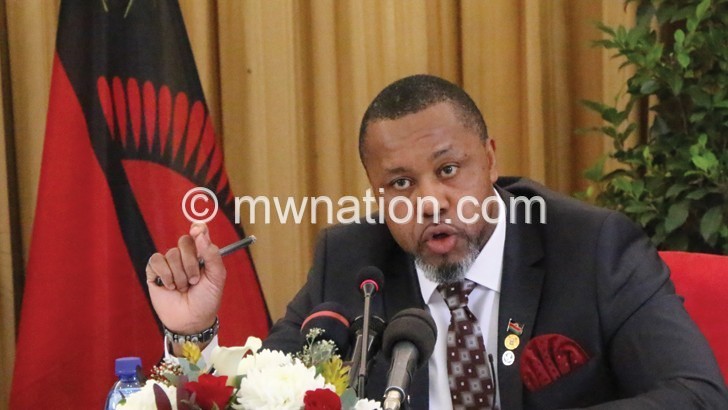Strip president of immunity—VP
Vice-President Saulos Chilima has called for the amendment of a constitutional provision that shields a sitting President from criminal prosecution, saying it gives the presidency licence to commit corrupt crimes.
Chilima—whom The Nation asked to comment on State House’s challenge in Nation on Sunday that the Vice-President should name and report to the Anti-Corruption Bureau (ACB) those he thinks are corrupt—said on Monday that the presidency, whose occupants are employees of citizens, should not be immune from prosecution during their term of office.

Section 91 of the Republican Constitution gives immunity from civil lawsuits and criminal charges to a person holding the office of President or performing the functions of President.
Section 91 (2) reads: “No person holding the office of President shall be charged with any criminal offence in any court during his term of office.”
However, a former president loses immunity and is liable to prosecution for any acts done in his official capacity.
Chilima has come under fire from State House after repeatedly mentioning that the Democratic Progressive Party (DPP) is riddled with corruption, nepotism and cronyism.
On Sunday, State House press secretary and spokesperson for President Peter Mutharika Mgeme Kalilani challenged Chilima to report to the ACB instead of making “wild corruption claims”.
But in response to the challenge, Chilima said it did not make sense for an employee [occupant of the presidency] of citizens not to be charged or prosecuted for criminal acts carried out during the period of employment while the employers, Malawians, did not enjoy such a luxury.
“This provision is a licence for the presidency to conduct corrupt practices knowing he would not be prosecuted. I am calling for an amendment to this section in the Constitution if we are to truly fight corruption in this country,” he said in an e-mailed questionnaire.
Asked to comment on Chilima’s statement, Kalilani said he would reserve his comment since the statement was not addressed to the President.
He said: “We would not want to discuss the merits of the proposal but framers of the Constitution would explain why such a provision is in the Constitution and how it functions.”
If the provision were to be amended, the Veep would also not be protected from prosecution or civil lawsuits.
However, constitutional law commentator Professor Danwood Chirwa said the immunity was only temporary during the tenure of office to protect the President from false charges while in office and ensure that the President dedicates all his or her time to matters of governance and the State.
Chirwa said: “Criminal trials are time consuming, especially for high profile politicians, a trial could bring a government to a standstill.”
He added that the idea to scrap Section 91 was not plausible and was not one of the challenges to fighting corruption.
According to Chirwa, removing the provision would put agencies such as ACB under tight government control or even deprived of funding to carry out their duties.
“It has been difficult to prosecute former presidents in Malawi for corruption. Rarely too have ministers, who do not enjoy similar immunity, been prosecuted. Where they have been prosecuted, the investigation and prosecution were poorly conducted. At core of the challenges is the lack of independence of the investigative and prosecutorial agencies and a corrupt political culture that reproduces itself,” he said.
Outgoing Malawi Law Society president Mwiza Nkhata, who is also associate professor of law at University of Malawi’s Chancellor College, generally agreed with Chirwa.
He said the provision was put in to allow a sitting President to focus on running the country not court appearances.
He said: “Whether this has worked well for us or not, the jury is still out. To gauge if prosecution after a term of office is the best way to go, we will have to take a judicious approach. For example, the Bakili Muluzi case, the reason it has not moved forward is not a fault of Section 91, but it’s politics.”
No president has been successfully prosecuted since the new Constitution came into effect in 1994. n





